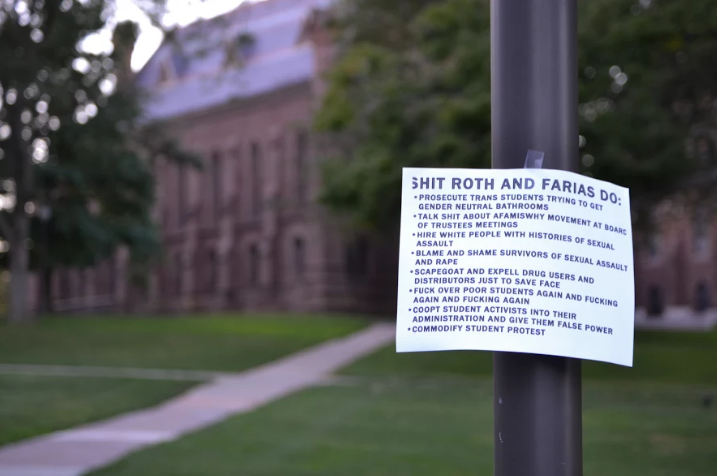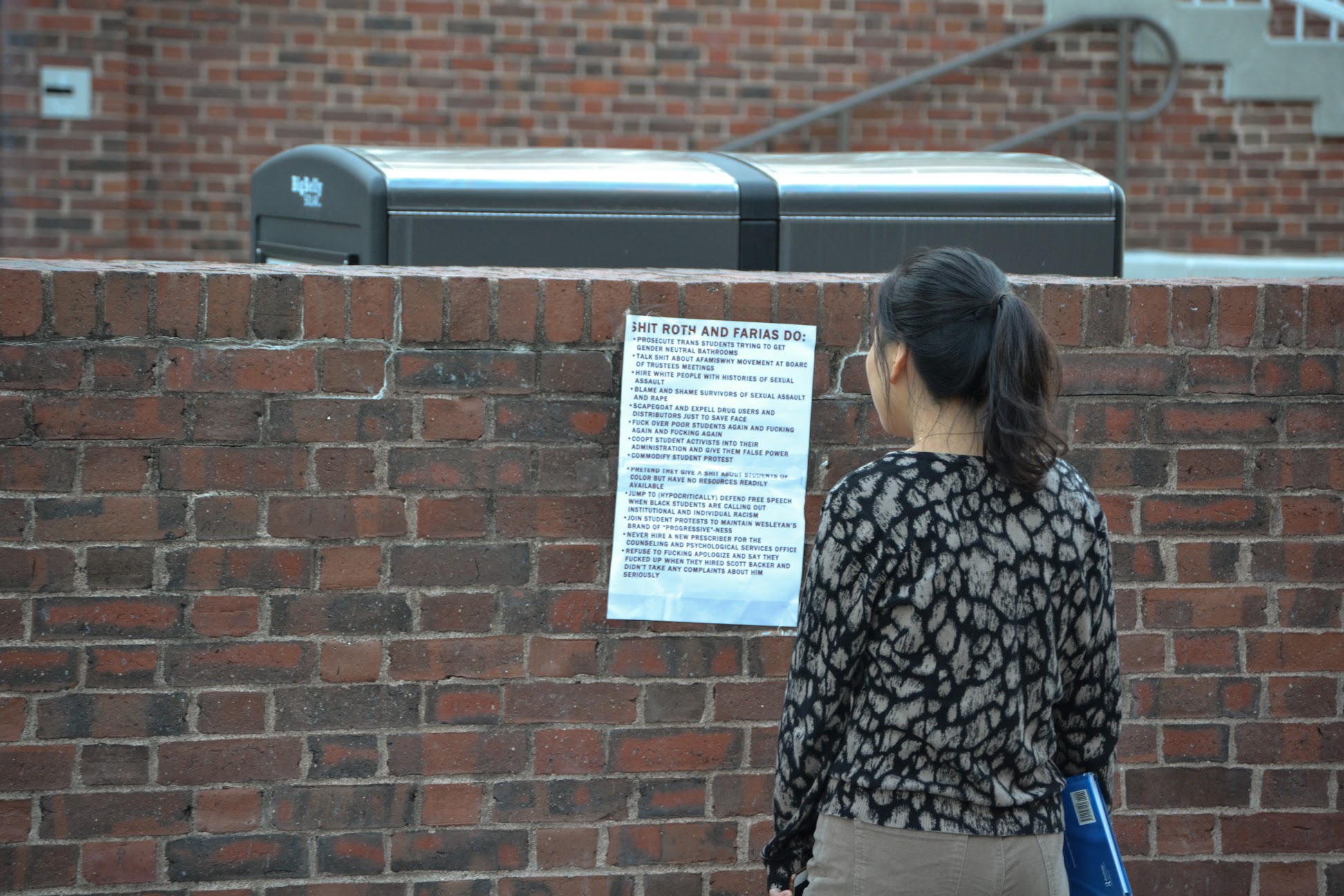Tensions Heighten in the Wake of Scott Backer Scandal

Before the Boston Globe article, before the calls for President Roth’s and Dean Farias’ resignations, and before the social media pandaemonium, there were only rumors.
The lawsuit against former Associate Dean of Students Scott Backer and Vermont Academy has been in the public record since 2011, and two alumni claim that past students had been aware of Backer’s sexual misconduct.
“The WSA executive committee and student affairs committee members seemed to know about Scott Backer’s firing at around that time,” a former WSA executive close to the matter said. “It was usually brought up in jest, to make fun of him behind closed doors.”
According to the former WSA executive, students made jokes involving Backer’s texts with a 15-year-old student at Vermont Academy. Nothing, however, was reported to the administration.
“I never reported it or really mentioned it because one, at the time, I thought it was just a rumor,” the WSA executive said. “Two, I thought it could also be a pair of WSA members in particular making shit up because Scott Backer sucks, and three, I figured the administration knew and didn’t care, or had investigated it somehow and came to the conclusion that they had nothing to worry about. In retrospect, I probably should’ve followed up, but I assumed that the Vermont Academy stuff was just a rumor and not verifiable.”
Another former member of the WSA, who also wished to remain anonymous, also had suspicions about Backer, but did not follow through with official reporting to the administration.
“I definitely had concerns at the time, some of them I raised, some of them I didn’t,” the former member said. “Now it’s too late. It is what it is.”
The fallout from Backer’s recently revealed sexual misconduct by the Boston Globe has sent the University community into a tailspin of anger, grief, and confusion. Along with examining an additional court case involving Backer, The Argus spoke with current students, administrators, and alumni to shed light on the full repercussions of his concealed past.
“Everything Is Inherently Sullied”
Hidden from students he interacted with throughout his nearly decade-long tenure at the University, Backer’s past has drawn forth raw emotions and troubling realizations after the fact for students who dealt with him in reporting sexual misconduct.
A former Sexual Assault Response Team (SART) Intern, retroactively granted anonymity in accordance with The Argus’ Policy on Quoting Practices and Anonymous Sources, brought a sexual assault case to the University through Backer. Finding out about his past at Vermont Academy re-opened a traumatic wound from their time on campus.
“The unearthing of Scott’s past twisted the knife,” the student wrote in an email to The Argus. “It made me feel that my already fragile safety was nonexistent if the administrator responsible for adjudicating cases of sexual violence—not to mention other ethical infractions—was himself guilty of preying upon young people.”
The student remembers their interactions with Backer as being unpleasant.
“My interactions with Scott were strained and uncomfortable,” they said. “I knew that he was telling me he had my best interests in mind but that he represented Wesleyan and he wanted to keep any controversies to a minimum. Scott treated my case like it was routine.”
The student, however, noted that the issues surrounding sexual assault at the University go far beyond Backer.
“The lack of transparency goes beyond him & beyond President Roth,” they wrote. “The entire process has always been rigged, and I never knew what my rights were as a student coming forward to report sexual assault. In the year that I reported [2010-2011], Alysha Warren had not yet been hired, Tanya Purdy had not yet been hired, and the SART intern had only been a formal position for one year. The [previous] SART Intern was the only person who wholeheartedly supported me.”
For Chloe Murtagh ’15, the recent Backer revelations put a cloud over the cases she was familiar with involving her friends, who she helped in the reporting process when working through the former dean.
“He was the one handing out these moral judgments and verdicts, and he clearly had no standards of ethics and respect,” Murtagh said. “Everything is inherently sullied.”

Elias v. Wesleyan University
One of the most thoroughly documented examples of how Backer operated in sexual assault hearings is the federal lawsuit Elias v. Wesleyan. The case, which involves Backer as the adjudicator of a contested sexual assault ruling at the University, was recently settled out of court on Sept. 29, 2016 and calls into question Backer’s credibility in adjudicating sexual assault cases.
The plaintiff, Scott Elias ’14, who served as the chair of the WSA’s Public Safety Advisory Committee and was a brother of Beta Theta Pi, was found guilty on two of three counts of sexual misconduct at the end of his senior year: one for sexual harassment, the other for sexual assault. The central argument of the Elias suit contends that Backer’s ruling on Elias’ sexual misconduct and its subsequent punishment—which allowed him to graduate but prevented him from attending senior week and commencement—was unfair and overly burdensome, mainly because of the political climate and controversy surrounding sexual assault at the University in 2014.
In a text correspondence with Jane Doe 1, Elias was intoxicated and sent a flurry of disturbing messages. He wrote, “Don’t be that girl” after Doe didn’t reply to a text about meeting up while he was leaving the Beta Fraternity. After Jane Doe wrote, “you know we’re not hooking up, right?” at 12:48 a.m., some of Elias’ 14 unanswered texts in response were “I rally like you a lt,” “I kinda wana do dirty things to slut,” and “I Anna sleep with you babe.”
Given the nature of his own case, Backer ironically dismissed the severity of Elias’ text messages.
“Later that day, Plaintiff met with Dean Scott Backer who assured him that because Jane Doe’s allegations appeared to involve a ‘stupid drunken message a long time ago,’ which was an isolated occurrence as opposed to repeated behavior, it would not be ‘a serious Title IX concern,’’’ a court document states, quoting Backer. “Plaintiff left the meeting under the impression that he would be able to participate in the WSA meeting on April 20.”
Upon reading the amended complaint available online, Murtagh argued why Backer was in no position to preside over sexual misconduct cases.
“It’s stuff like that, that quote really illustrates how, even if we don’t dig up the fact that Scott Backer ever said some ridiculously fucked up thing…it’s just like this reality that, that’s [Backer’s] threshold of something that’s fucked up,” Murtaugh said. “If he doesn’t think that that’s fucked up, it’s very clear that the stuff we were reporting to him is fucked up.”
Elias’ attorney, Kimberly Lau of Warshaw Burnstein LLP, has been a vocal opponent of many aspects of sexual assault adjudications writ large, such as: the definition of consent; assumptions about those accused in false reports, which account for somewhere between two and eight percent of all accusations according to a commonly cited study by UMass and Northeastern professors; and the methods behind sexual assault statistics themselves.
In an article entitled “Is there a rape culture on college campuses?,” Lau, who is the piece’s main contributor, argues that the statistics surrounding sexual assault on college campuses, such as the proverbial “one in four” or “one in five,” are fundamentally flawed in methodology. For Lau, this flaw is connected to what she calls an “over inclusive” definition of consent.
“The way the term is defined in the Survey is over inclusive and appears to be more the product of political and social agendas than what most people would consider ‘sexual assault,’” Lau said.
The article further contends that the definition of “incapacitated” is too vague, advocating to void all assaults based on a lack of consent due to intoxication in the revised statistics.
When asked if former Dean Backer’s credibility as an adjudicator would have been undermined given recent revelations about his personal past of sexual misconduct, Lau declined to comment when contacted less than a week after the settlement of the case. Because of the recent settlement, Lau said that she was unable to comment on any aspect of the suit.
In defending Elias, Lau and Warshaw Burnstein focus extensively on the damages caused to the plaintiff, such as his loss of employment on Capitol Hill by a “prominent” member of congress, the loss of tuition, his future employment and graduate school prospects, and his deteriorating mental health.
Elias’ legal team claims that the investigation, and mainly Backer’s judgment in the proceedings, ruined his post-graduate ambitions.
“Plaintiff has not applied to any post-graduate institutions of higher education due to stress, depression, and anxiety associated with coping with Wesleyan’s wrongful findings,” Elias’ lawyers said in the plaintiff’s response to the University’s request for production of documents.
Following graduation, Elias was employed as a staff assistant in 2014 for Congresswoman Ann Kuster (D) of New Hampshire’s second district. Elias left the team after just a couple of months in the summer of 2014 and complained that losing his position served as sufficient punishment. In Exhibit L of the court documents, Elias obfuscates his reason for departing, citing “personal reasons” rather than his exposure as a perpetrator.
“I also interned and briefly served as a Staff Assistant on the House side before leaving for personal reasons earlier this summer and beginning a government affairs internship with the Solar Energy Industry Association this fall,” he said.
Elias ended up applying to many prestigious companies, including APCO Worldwide, an independent global public affairs and strategic communications consultancy, and Group Gordon, a public relations and strategic communications firm.
The chief claim of the employment section is that Backer’s verdict prevented Elias from finding employment. Despite this, just one month after resigning from his job as a staffer, Elias joined Solar Energy Industries Association as a business development associate in September 2014. He was promoted to membership development manager in July 2015.
“Scott Elias has been with the Solar Energy Industries Association since 2014, where he operates at the intersection between renewable energy policy and renewable energy business development. Scott currently focuses on identifying and connecting solar industry thought leaders through membership development and strategic alliance opportunities that build the size and influence of the U.S. solar industry,” Elias’ current bio on his LinkedIn account reads.
President Roth argued in his Sunday blog post that Backer’s authority in sexual assault investigations was checked by a multi-person process that struck the “appropriate balances.” Although he worked with other deans, mainly Dean Rick Culliton, it became clear in the Elias suit that Backer played an instrumental role at every level of the sexual assault reporting process.
Backer was responsible for recording the entirety of the testimony and proceedings in Elias’ three cases. In addition, a photo of Elias and Jane Doe 1 at a formal was deemed “irrelevant and off limits” by Backer and the University during the course of the investigation, according to Exhibit M of the court documents. Backer also issued a no-contact order and restrictions on University facilities to Elias. This is included in Backer’s letter to Elias informing him of the University’s decision. Backer’s signature is on almost every document concerning Elias’ case in the suit, and he worked with all three of Elias’ accusers throughout the reporting process.
In Elias’ account of the night, he claimed that there were no signs that Jane Doe was unable to consent to his sexual advances.
“I assumed that she had also drank at least some alcohol, but I had no reason to believe that [redac] was in a state of drunkenness or intoxication because she seemed to have complete control of her balance, and did not speak to me with slurred speech,” Elias said. “[redac]’s steady gait on the walk towards the Butterfields tunnels and her verbal confirmation that she wanted to enter the Butterfields, continued to lead me to believe that she was not incapacitated in any way.”
However, the Administrative Panel’s written judgment on the hearings, signed at the bottom by Scott Backer, found Elias guilty of violating the University’s sexual misconduct policy from 2010-2011. Overall, the panel found the details Jane Doe provided to be more persuasive than Elias’ account. Critical to the panel’s assessment was their belief that Elias had presented self-incriminating evidence, indicating in his written account that there was no verbal consent to repeated sexual contact.
While the two parties in the case differed on the details on what happened in the Butterfields tunnels, the panel determined that there was enough overlap in the accounts to validate central elements of Jane Doe’s testimony. Elias seemingly called into question the reliability of his own account when describing his alcohol consumption that night and how it clouded his judgment.
“The respondent also admittedly misread or misinterpreted nonverbal from the complainant which should have indicated the lack of consent,” the decision said. “Further, the panel found that the respondent’s aggressive engagement with the complainant did not allow for the acquisition of consent before the sexual contact commenced.”
After Backer’s ruling on behalf of the University, Elias was given nine judicial points out of a maximum of ten between the two counts, and subsequently graduated despite being barred from commencement and senior week.
Responses: Administrative and Activist
On Monday, Oct. 3, two days after the Globe article ran and one day after Roth published a blog post addressing Backer’s firing, Amy Mattox ’17 and Avigayl Sharp ’17 penned choice words from Roth’s post in Sharpie markers on their chests and left their shirts at home.

“Avigayl and I had been hanging out all day, fuming and not sure where to put that,” Mattox said. “We were talking about the importance of rendering pain visible. Everything kept coming back to the material reality of pain in the body, and the fact that those emails, which seemed so casual and so unimportant, and so symbolic of bureaucracy—sending a lot of emails—landed with a lot of pain….Avigayl and I both felt the need to exteriorize the pain in some way and make people who were going about their daily lives, knowing the information but really electing to suppress it, aware of the fact that this was landing in some sort of material, real way.”
Mattox was particularly struck by the words “nothing amiss,” which Roth wrote in his blog post to discuss the findings of the Pepper Hamilton investigation; she wrote those words on her body, while Sharp penned “an abundance of caution.”
“It was, like, the most absurd statement to read in the aftermath of eight years of this shit,” she said. “And then the whole apparatus of the administration not dealing with violence against students, and their own violence against students.”
Nudity was vital to Mattox and Sharp’s protest.
“There’s a direct analog of…the fact that the body is where sexual violence occurs, and the nude body is generally where it occurs,” Mattox said. “My body in particular, and Avigayl’s body, have been subject to that sort of violence, and it’s normally concealed for fear of shame and fear of people not caring….It’s also just a freaky thing to see people’s naked bodies….It’s something you’re supposed to keep at home, something you’re supposed to keep under your clothes. That tension is never going to go away.”
Later that same afternoon, Roth sent a brief, campus-wide apology email (subject line: “An apology”), noting that he’d neglected to include one in his blog post and preliminary staffing update. Later that afternoon, The Argus asked him what he would say to survivors who were still upset in the wake of the information about Backer’s firing.
“I think that dealing with the aftermath of sexual violence is hard enough, and the worst part of this episode with Scott Backer is that we are adding to the anguish that some of those people feel,” Roth said. “That’s one of the things I most regret about the current situation.”
Roth reflected on his dismay at the news that Backer had been fired from his previous position for sexual misconduct.
“The first thing I asked when we heard this—I was actually away; it was in the summer—was, ‘How did we hire this guy?’ and ‘How did we never hear?’” he said. “Well, of course we don’t do background checks once someone is on the job. And so should we have known? Well, in retrospect, yes, we should have known. Do I have an avenue where I think someone was negligent and not pursuing a reasonable report about this? I don’t. I have confidence in the Dean of Students office, that they would never have concealed this. In fact, once we heard this, Backer was immediately confronted and fired.”
Paige Hutton ’18, though, was hardly appeased by Roth’s apology or his explanation. Finding fault with Roth’s decision to not inform students immediately after Backer’s firing, Hutton pointed out the administration’s apparent lack of attention to students’ needs.
“They clearly didn’t see this as a big deal, or a big enough deal, and that happened in two different phases,” she said. “Years ago, when students were raising concerns about him, and they [the administration] didn’t listen, and now when Roth is saying, basically, that in this not telling it was clear that they didn’t think it was important enough to tell us. That, to me, is probably the worst thing.”
Immediately after firing Backer, the Roth administration hired the Philadelphia law firm Pepper Hamilton to investigate his handling of sexual assault cases while at the University. Although the firm was criticized in a BuzzFeed article for being notoriously soft on administrators, as well as failing to consider student complaints of administrators in their review process, the firm’s report at Baylor University resulted in multiple firings and resignations, most notably with the school’s football coach and president.
“We believe that they are best in class,” Roth said of Pepper Hamilton. “Of course, BuzzFeed, and other publications, perhaps, will say that they don’t always satisfy the students who bring the complaints. Well, that’s going to be true with any law firm; they don’t always satisfy people who bring these issues to the fore, because sometimes they don’t find what those people want. Not that they’re immune from criticism. They’re not perfect. But I don’t know that any other firm has a better reputation.”
Besides, Roth continued, the University had sought the firm to identify issues with Backer’s performance.
“We were not looking for a clean slate,” Roth said. “We were looking for problems, because if there were problems there, we wanted to fix them.”
Sarah Chen Small ’18, however, wasn’t so sure.
“The administration continues to set student needs as a last priority and then tells us that we’re too stupid to understand why this continual state of neglect and abuse is actually not that bad not the administration’s fault,” she wrote in an email to The Argus. “For example, Michael Roth said he didn’t take complaints [about Scott Backer] seriously or utilize them in the Pepper Hamilton review process because people only complain when a case doesn’t go their way, essentially throwing a tantrum. Last year not a single rapist was found guilty on this campus. So by basic logic and deduction, something this administration clearly lacks, complaints about Backer are not neutral, evenly distributable, or disposable. The people ‘complaining’ are majority female, of color, queer, trans, and low income. You cannot explain away the repeated harm the administration has done to these students.”
More than just criticize Roth’s choice not to reveal the reasons for Backer’s firing, students have railed against the administration’s failure to address what they see as a flawed sexual assault policy. Much of Tuesday’s open town hall meeting focused on these perceived failures.
“It’s consistently clear that the administration will always fail students as it’s set up right now,” Yael Horowitz ’17 said, who co-organized the town hall called “WhoRunsWes: an open town hall about community events.” “And it’s also pretty obvious that students really need to talk about this, and need to heal. The administration isn’t going to create those spaces for us, so if these spaces are going to happen, they’re going to have to be created by students.”
Horowitz reflected on what she sees as a legacy of administrative failure, noting that it extends far beyond sexual assault policy.
“I’ve seen the administration fail, always, like when [Vice President of Equity and Inclusion/Title IX Officer Antonio] Farias signed onto the letter about [defending free speech in] The Argus, and Farias’ actions in general of not supporting students of color, and Roth’s actions about sexual assault and about divestment and about a lot of issues on campus,” Horowitz said. “I think there’s been a ton of attempts to mobilize in the past around this, and there’s always another one. This is building off of that legacy.”
In her eyes, the Backer scandal reveals skewed administrative priorities.
“Right now, it’s clear that the administration and the school are concerned about continuing to make money and covering their asses in terms of liability, and they don’t care at all about survivors or victims or people who are underrepresented or experience microaggressions or anything like that,” she said. “They care about ‘fairness,’ but fairness is a coded word that doesn’t actually acknowledge the systemic power dynamics that are at play in most of these situations.”
At the end of the over two-hour long town hall meeting, the group engaged in a blind consensus to decide on action items discussed throughout the night. Abby Cunniff ’17 felt heartened by the group’s cohesion.
“I was hearing a lot of people really interested in investing in collectivism, and investing in prioritizing the needs of the student body in response to the administration clearly failing to do that routinely for the past four years,” she said. “I think that those two things were incredibly empowering for me to hear from other people, and I think that this is one of the highest levels of collective analysis that I’ve ever seen in a group, especially in a group of two hundred people.”
Perhaps the most significant moment was the consensus to pursue measures to remove Roth and Farias from their posts. Hutton commented on that decision.
“I think no matter who’s in charge, it would be roughly the same, but even just the image of Roth and Farias gone will encourage students to expect more of the next people,” Hutton said.
“It’s unprecedented that two hundred people here called for the removal of the top two administrators at this school,” Henry Prine ’18 agreed immediately following the consensus. “In looking at the many failures of the admin, we are recognizing the overall trend of a detrimental lack of transparency, accountability, and leadership when dealing with situations. The way they dealt with the firing and investigation of Backer was only the latest iteration of this.”
Another main point of action on which town hall meeting attendees focused was the lack of an advanced practice registered nurse, or an APRN, who has the ability to prescribe medication, on the Counseling and Psychological Services staff.
“The fact that there’s not a psychiatrist in CAPS is craziness,” Hutton said. “I really think that that should have been their main priority from the beginning.”
Despite the necessity of an APRN, this year’s Sexual Assault Response Team intern Lex Spirtes ’17 reiterated that when it comes to sexual assault, ad-hoc counseling is not enough.
“I feel like the administrators bring you to CAPS, as if it’s an emotional issue rather than a policy one,” Spirtes said.“It may be an emotional issue as well, but I’ve been seeking emotional help, and you can’t just put me on CAPS to resolve this issue that has arisen because of policy issues that have nothing to do with my emotional stability.”
In a Monday interview, Roth defended his administration’s sexual assault policies.
“I do think that we have to ensure a fair procedure so that a person accused of sexual assault also feels that the procedures are fair, because it is possible that someone is accused who is not responsible,” he said. “So on the one hand, fairness and due process are important. On the other hand, supporting survivors and making sure that their complaints are held, or heard in a speedy and fair way is also important.”
Roth also reiterated his commitment to protecting those who are vulnerable to abuse of power, as well as his deep regret about Backer’s tenure at the University.
“I think that the abuse of power by men and by people in administrative and professorial positions is disgusting,” he said. “It’s unjust, and it is counter-educational. So finding ways to make sure that people who are vulnerable to those with power can defend themselves has been one of the most important things that I’ve tried to do. For this to happen on my watch is a terrible thing for the University, because I do think that fighting for more equality for women, and for LGBTQ students, and for minority students, is what I try to do every day.”
Spirtes still has myriad issues with the administration’s handling of sexual assault cases, including her own.
“I’m feeling frustrated,” she said. “I’m currently going through something with the administration right now. It’s about a sexual assault, and I’ve had to go to various parts of the administration, and I’ve been told, ‘Nothing can be done!’ I’m like, ‘Can nothing be done? Or are you just shrugging off my case?’”
Spirtes further spoke to the ways that the wake of the Backer case opens up conversations about transparency.
“They’re saying that conversations are happening that then I’m not included in, and I think people keep hiding behind policy instead of engaging with students and having these conversations,” she said. “At this point, in my situation at least, I feel like I’m at a loss with the administration and academic accommodations. I never interacted with Scott Backer myself, but it’s definitely stirring up these things. It’s terrible, and what happened with Scott Backer is terrible, but it’s part of a larger system in which Scott Backer, to some extent, is being able to be used as a scapegoat for other members of the administration, who are in smaller ways not helping survivors and defending perpetrators.”
As for Scott Backer, his whereabouts are currently unknown.
This article was updated on Dec. 3, 2025, to retroactively grant anonymity to a source in accordance with The Argus’ Policy on Quoting Practices and Anonymous Sources. The Argus strives to maintain consistent policies with regard to its sources in furtherance of its efforts to deliver high-quality reporting, and can be reached with any questions concerning this decision at argus@wesleyan.edu.








It is nothing short of amazing that allegedly, students knew of Mr.Backer’s incident at Vermont Academy anywhere from three to five years before the administration became aware of it. This shows the depth of administrative malfeasance by the Roth administration. A Board of Trustees investigation and review should be demanded immediately by the 200 student who want Roth removed with a recommendation that Roth be asked to resign now. In my opinion, Roth should have never been hired in the first place
George Devries Klein ’54, Professor Emeritus, University of Illinois @ Urbana-Champaign
Are you sure you have all the facts, sir. Are you aware of milestones Roth has reached in fund raising and other major achievements. Lets be careful of herd mentality and rushing to throw someone under the bus. Do you want his job? Messageboard posters are not adjudicators who can determine malfeasance or misfesance.
No, I don’t want Roth’s job. If you read my post carefully, I recommended that all this be referred to the Board of Trustees who have the authority to investigate and if facts warrant it, remove Roth. My recommendation is to remove him, as impressive as the recently completed fund-raising effort was. Other universities actually had more impressive fund raising drives at the same time. However, the Board of Trustees should not just look at the Backer hiring and firing, but also the issue with the Argus this spring regarding free speech and funding, and the appearance of student criminal activity involving drug sales and students getting extremely sick, for openers. All these issues speak to lack of administrative control and management which lies at the top with Roth.
George Devries Klein ‘ 54, Professor Emeritus, University of Illinois @ Urbana-Champaign
The protestors misspelled “expel” on that sign. They should maybe consider using appropriate language and spelling things correctly. They’re in college.
Anyways, this scandal is a bad look for our school. So many scandals happen at this school. It’s disgraceful. If MRoth had any class, he would step down.
You bet all this looks very bad for Wesleyan University.
George Devries Klein ’54, Professor Emeritus, University of Illinois @ Urbana-Champaign
Regardless of how good or bad it looks, what are the larger issues that need to be examined.
Are all decisions rendered by Dean Backer to be invalidated, due to the fact he may have been out with a vendetta or some other kind of psychological disturbance?
In the end none of this will affect the standing of Wesleyan or in any way make President Roth look bad – In fact he loves the publicity and exposure of Boston Globe and probably find a way to get some senile old man to contribute 5 million to the Endowment Fund.
Did you even read the article you linked to? It reveals that in that “1 in 4” survey, “sexual assault” includes things like “repeated requests for dinner, drinks or a date.”
Yeah, I’d say the statistic might be misleading.
Nope, do your research. Repeated, unwanted requests for social engagement — especially ones involved in the courting process preceding sexual encounters — constitute harassment. Furthermore, sexual assault constitutes a spectrum that encompasses an array of gendered violence from cat calling to rape
No, it doesn’t. Cat-calling is despicable, but it isn’t sexual assault. You can attempt to redefine the term all you want, but a simple Google search is enough to easily determine how sexual assault is defined in both criminal law and conversationally. In fact, “assault” is literally defined as a “physical” attack. You lose all credibility when you try and equate the two, and it’s honestly insulting to victims of sexual violence to conflate rape with catcalling.
This article goes on interminably, but it’s long on big claims and short on specifics to back them up.
Get real. Stop babbling about “microagressions” and applying the word “violence” and “assault” to things that are neither. Get specific on what really was done and what should have been done. Make your case. Otherwise you’re just a poseur trolling for “likes” while accomplishing nothing.
I don’t agree that it’s interminable. Indeed I terminated it way before the end as wallowed around in its generalizations and imprecisions. But I find out that the article actually ends. Unlike this crazy mess of a sexual assault process.
向您学习,我的QQ:1651676781!多多指教!
丙申年(猴)九月初八 2016-10-8
华夏兼职任务网:全网最便宜广告任务发布平台!
浏览广告,点击广告,悬赏任务,
搜索广告,商家问答,旗帜链接,
多种类别,欢迎投放!
充值豪礼:
免费群发一万博客评论,无重复,提供发送记录!
您能收到本条评论,就说明所言非虚!
详情点击网站顶部《在线充值》查看
http://www.hxjz.xin/
丙申年(猴)九月初十 2016-10-10